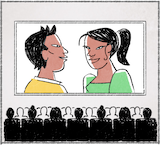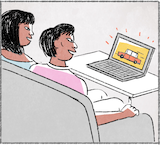

อันนี้อยู่ใส อันนี้อาดสิเป็นโลงหนังกะได้ อันนี้อาดสิอยู่ในโลงหนังเนาะ
มีคนหลายคนกำลังนั่งเบิ่งหนังอยู่ นั่งเบิ่งหนังจอบักใหญ่พุ้นแหล้ว จอสี่เหลี่ยมบักใหญ่เติบ
แล้วกะอยู่ในจอนั้นกะมีคนสองคน พุหญิงกับพุซาย อาดสิเป็นพะเอกกับนางเอกกะได้ กำลังสะแดงหนังหลือว่าสะแดงละคอนอยู่เนาะ แล้วกะมีคนหลายๆ คนกำลังเบิ่งเขาสะแดงอยู่
แล้วคนสองคนนี้พุดีบ่ กะอาดสิพุดีกะได้ ขั้นบ่พุดีกะสิบ่เป็นพะเอก ขั้นบ่งามกะสิบ่เป็นนางเอกเนาะ
15
สองคนนี้เขากำลังเฮ็ดหญัง เขาอาดสิเบิ่งหนังอยู่ แนมไปกะเห็นแต่เขาแนมเบิ่งหนังอยู่
อาดสิเป็นหนังที่เขาเปิดอยู่ในค็อมพิวเต้อกะได้ อันนี้กะเป็นค็อมพิวเต้อ หลือว่าโน่ดบุ่กเนาะ เป็นค็อมพิวเต้อน้อยๆ ที่พกพาได้ หลือว่าถือไปได้เนาะ
เขานั่งอยู่นำกันสองคนแม่นบ่ แม่น เขานั่งอยู่นำกันสองคน พุหญิงกับพุซาย เขากำลังแนมเบิ่งหนัง หลือว่าแนมเบิ่งละคอนอยู่
แล้วเขานั่งอยู่ใส สองคนนี้เขานั่งอยู่เทิงโซฟา อาดสิเป็นโซฟาอยู่ในเฮียนอยู่ในบ้านของเขากะได้ เขากำลังเบิ่งกันอยู่สองคนนั้นหละ
Link to overview page
Link to dictionary
| Isaan | Pronunciation | Tones | Thai | English/Notes |
|---|---|---|---|---|
| อัน | an | M | อัน | 1. thing, object 2. general clf. for objects |
| นี้ | ni: | HF | นี้ | 1. this 2. here |
| อยู่ | yu: | H | อยู่ | 1. to be (located) at 2. yet, still 3. auxiliary indicating continuous or progressive action {ทอดปาอยู่ในกะทะ = (in the process of) frying a fish in the pan} {แม่กำลังเมี้ยนเฮียนอยู่ = mother is cleaning/tidying up the house} |
| ใส | sai | M | (ที่)ไหน | 1. where? {สิไปใส = Where are [you] going?} {มาแต่ใส = Where are [you] coming from?} {กะทะอยู่ใส = Where's the pan?} 2. somewhere, anywhere {ใสกะได้ = anywhere, wherever you like} |
| อาด | a:t | LF | อาจ | 1. might, may, will 2. likely |
| สิ | si | M | จะ | future tense auxiliary {เขากำลังสิตื่น = he's about to wake up} {สิไปตะหลาด = [I'm] going to the market} |
| เป็น | pen | M | เป็น | 1. to be, to exist 2. to be able to 3. to suffer, sth. happens to 4. เป็นหญัง[...]คือ in initial position: why? {เป็นหญังเขากะคือแปงฟัน = Why is he brushing his teeth?} {เป็นหญังเคี่ยงบินมันคือสิตก = Why is the airplane falling down?} |
| โลงหนัง | lo:ŋ-naŋ | HR-M | โรงหนัง | cinema |
| กะ | ga | M | ก็ | 1. then, consequently 2. also |
| ได้ | dai | HF | ได้ | 1. can 2. to get, to obtain 3. before verb: indicating past tense 4. บ่ได้ + verb: not |
| ใน | nai | HR | ใน | in, within |
| เนาะ | nɔ | H | เนาะ | final particle: makes the statement softer, looking for agreement |
| มี | mi: | HR | มี | 1. to have 2. there is |
| คน | khon | HR | คน | person, people |
| หลาย | la:i | M | เยอะ, มาก | many, much, very |
| กำลัง | gam-laŋ | M-HR | กำลัง | auxiliary indicating continuous or progressive action |
| นั่ง | naŋ | H | นั่ง | to sit |
| เบิ่ง | bəŋ | H | ดู | 1. to look at, to see, to watch {เบิ่งโทละทัด = to watch TV} {เบิ่งหนัง = to watch a movie} 2. to guess {เบิ่งซงแล้ว ... = [I] guess / from what it looks like ...} |
| หนัง | naŋ | M | หนัง | 1. skin 2. movie, film {เบิ่งหนัง = to watch a movie} |
| จอ | jɔ: | M | จอ | screen |
| บัก | bak | M | 1. intensifier before adjectives {ปาโตบักใหญ่ = a (very) large fish} 2. prefix in front of fruits and vegetables {บักแตงโม = watermelon} 3. can be used as a reference for a male person of the same or younger age {บักอันนี้ = this lad} |
|
| ใหญ่ | ɲai | H | ใหญ่ | large, big |
| พุ้นแหล้ว | phun-lɛ:o | HF-LF | นู่นแหละ | auxiliary for emphasis at the end of a phrase Notes: variant of พุ้นหละ |
| สี่เหลี่ยม | si:-li:am | H-H | สี่เหลี่ยม | rectangle, square |
| เติบ | tə:p | LF | intensifier: very, much {เว้ากันโดนเติบ = to talk a long time} | |
| แล้ว | lɛ:o | HF | แล้ว | 1. finished 2. already 3. and then, and next (especially แล้วกะ) 4. auxiliary for past tense |
| นั้น | nan | HF | นั้น | that, there |
| สอง | sɔ:ŋ | M | สอง | two |
| พุหญิง | phu-ɲiŋ | H-M | ผู้หญิง | woman, female |
| กับ | gap | M | กับ | 1. and {ลุงกับป้า = uncle and aunt} {กวยเตียวหมูกับกวยเตียวไก่ = noodle soup with pork and noodle soup with chicken} 2. with, to {ค้ายๆ กับคำว่า ... = similar to the word ...} 3. prefix in front of foods {กับเข้า = side dishes eaten with rice} {เขากินกับกวยเตียว = he's eating noodle soup} |
| พุซาย | phu-sa:i | H-HR | ผู้ชาย | man, male |
| พะเอก | pha-e:k | H-LF | พระเอก | leading actor (in a movie, play etc.) |
| นางเอก | na:ŋ-e:k | HR-LF | นางเอก | leading actress (in a movie, play etc.) |
| สะแดง | sa-dɛ:ŋ | M-M | แสดง | show, play, perform |
| หลือ | lʉ: | M | หรือ | or |
| ว่า | wa: | H | ว่า | 1. that, as {คำว่า X = the word X} 2. to say |
| ละคอน | la-khɔ:n | H-HR | ละคร | play, drama, theater, show, fiction |
| เขา | khao | M | เขา | personal pronoun: he, she |
| พุ | phu | H | ผู้ | 1. person 2. clf. for people {พุหญิงพุหนึ่ง พุซายพุหนึ่ง = a woman, a man} {ซู่พุซู่คน = everybody} {พุหนึ่งโตจ่อยๆ พุหนึ่งโตบักอ้วนหนึ่ง = one person is slim, the other is fat} Notes: pronunciation: also realized as พู่- |
| ดี | di: | M | ดี | good |
| บ่ | bɔ: | H | ไม่ | 1. no, not 2. question particle, transforming a statement into a question Notes: spelling exception in line with common usage on social media |
| ขั้น | khan | LF | เมื่อ | when, if |
| งาม | ŋa:m | HR | สวย | beautiful, handsome, splendid |
| เฮ็ด | het | H | ทำ | to do, to make |
| หญัง | ɲaŋ | M | อะไร, เป็นหญัง = ทำไม | 1. what {เขากำลังเฮ็ดหญัง = What is he doing?} {ธูปเอาไว้เฮ็ดหญัง = What are incense sticks for?} 2. something, anything, (nothing) 3. เป็นหญัง[...]คือ in initial position: why {เป็นหญังเขาคือใส่บักพิกลงไปในกวยเตียว = Why is he putting chili in [his] noodle soup?} {เป็นหญังหน้าต่างมันคือเปิด = Why is the window open?} {เป็นหญังมันคือมีควนไฟ = Why is there smoke?} |
| แนม | nɛ:m | HR | มอง | to look, to glance, to stare {เขากำลังยืนแนมก้อนหินอยู่ = he's standing and looking at the stone/rock} {ข้างหนึ่งแนมเห็น อีกข้างหนึ่งแนมบ่เห็น = [we] see one side, [we] can't/don't see the other side} |
| ไป | pai | M | ไป | 1. to go 2. auxiliary indicating action extending into the future |
| เห็น | hen | M | เห็น | to see |
| แต่ | tɛ: | H | แต่ | 1. but {แต่บ่ต่างกันหลาย = but not very different} {แต่บ่ลู้ว่าเขาญ่างมาแต่ใส = but [I] don't know where he's coming from, see also: แต่ว่า} 2. only {ตอนนี้มีแต่ขี้ฝ้า = now there are only clouds} |
| แนมเบิ่ง | nɛ:m-bəŋ | HR-H | มองดู | 1. to look at 2. to watch |
| ที่ | thi: | H | ที่ | 1. that, which {คนที่ยืนอยู่ฝั่งขวา = the person which is standing on the right = the person standing on the right} {เว้าคำที่บ่สุพาบ = to speak words which are impolite = to speak impolitely} 2. for ordinal numbers {ที่สาม = third} |
| เปิด | pə:t | M | เปิด | 1. to open {เปิดหน้าต่าง = to open the window} {เปิดปะตู = to open the door} 2. to start, to switch on {เปิดไฟ = to switch on the light} {เปิดแอ = to switch on the A/C} |
| ค็อมพิวเต้อ | khom-piu-tə: | HR-HR-HF | คอมพิวเตอร์ | computer |
| โน่ดบุ่ก | no:t-buk | H-H | โน้ตบุ๊ก | notebook, laptop |
| น้อย | nɔ:i | HF | น้อย | 1. few, little 2. small |
| พกพา | phok-pha: | H-HR | พกพา | to carry (on one's person) |
| ถือ | thʉ: | M | ถือ | 1. to hold 2. to carry 3. to regard as, to consider {สี่สิบองสาถือว่าฮ้อน = 40 degrees Celsius is considered hot} |
| นำกัน | nam-gan | HR-M | together, jointly, with one another {บ่สามาดใซ้นำกันได้ = can't be used together} {เขากำลังญ่างนำกัน = they are walking together} {เหล้นบ่าดนำกันบ่ = Shall we play basketball?} | |
| แม่นบ่ | mɛ:n-bɔ: | H-H | ใช่ไหม | question particle: ..., right? ..., isn't it? ..., don't you? etc. {เจ้าได้เห็นสิ่งนั้นแม่นบ่ = You've seen that, haven't you?} {ฝนกำลังตกแม่นบ่ = It's raining, isn't it?} {นี้คือกะคุแม่นบ่ = This is a bucket, isn't it?} |
| แม่น | mɛ:n | H | ใช่ | 1. yes 2. affirmative particle |
| เทิง | thə:ŋ | HR | บน | 1. on, on top of, at, in {เทิงโต่ะ = at/on the table} {กบมันนั่งอยู่เทิงใบบัว = the frog is sitting on the lotus leaf} {เทิงท้องฟ้า = in the sky} {มันแล่นอยู่เทิงลาง = [the train] runs on rails} {มีคนนั่งอยู่เทิงลดสามล้อสามคน = there are three people sitting in the tuk tuk} 2. up, upward Notes: pronunciation: also realized as ทัง |
| โซฟา | so:-fa: | HR-HR | โซฟา | sofa, couch |
| เฮียน | hi:an | HR | เรือน | house, home |
| บ้าน | ba:n | HF | บ้าน | 1. house, home 2. village (also used as a prefix before the name of a village) 3. home country, home region {บ้านเฮาเฮ็ดเข้าจั่งใด = How do we plant rice in Isaan/Thailand?} |
| ของ | khɔ:ŋ | M | ของ | of, belonging to |
| กัน | gan | M | กัน | mutual, each other, with another, together {เขากำลังนั่งเว้ากัน = they're sitting and talking} {เขาสองคนฮักกัน = they love each other} {ปาสองโตนี้ ใหญ่ห่างกันหลายบ่ = These two fish here, are they very different in size (from each other)?} {ต่างกัน = to be different (from each other)} {ก่องอันไหนหนักกว่ากัน = Which box is heavier (than the other(s))?} |
| นั้นหละ | nan-la | HF-M | นั่นแหละ | auxiliary for emphasis at the end of a phrase |